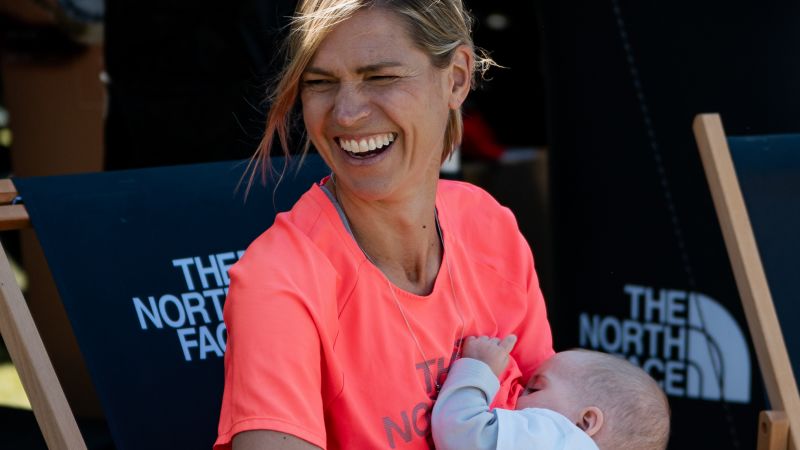When Stephanie Case participated in a challenging 100-kilometer ultrarunning race through the stunning Welsh mountains, her focus was not on winning. Six months after giving birth and still breastfeeding her daughter, Pepper, Case’s primary goal was simply to complete the Ultra-Trail Snowdonia by UTMB. She even received special permission from race officials to make in-race stops to feed her baby.
Remarkably, Case learned at the end of the race that her time made her the winner of the women’s category, despite having paused to feed her infant three times during the course. This surprising outcome was far from her mind as she had begun the race in the third wave, well behind the elite competitors.
“That was a huge shock. I wasn’t expecting that. It wasn’t even on my radar that that could have happened,” commented Case in an interview with CNN Sports. The images capturing her journey have since gone viral, sparking a wave of positive responses and some criticism, illuminating the multifaceted roles of modern motherhood.
Embracing Multidimensional Lives
Case shared that the viral images demonstrate a crucial message: “Life doesn’t stop when you become a mom; it’s just another layer to who you are as a person.” This idea is especially significant for new mothers who often grapple with the feelings of guilt associated with pursuing their passions. Case emphasized that prioritizing personal interests can enhance their abilities as parents and foster a sense of fulfillment beyond motherhood.
“Becoming a mom is one of the most physical and emotional transformations you can experience,” she said. “And so if there are things that you can hold on to—like running for me—that remind you of who you are, that’s crucial.”
The Journey Back to Running
Case, who has been involved in ultrarunning for nearly two decades, faced significant personal challenges before returning to the sport. Following her first marathon, she had latched onto ultrarunning as a way to explore her physical limits. However, she took a three-year hiatus after several miscarriages, which fundamentally altered her relationship with running. Questions about whether her running contributed to her miscarriages persisted, leading her to doubt her abilities in the sport she loved.
However, after the birth of her daughter and receiving the all-clear from her physician, Case re-embraced running just six weeks postpartum. Initially, it felt strange but gradually rekindled the sense of identity that she had cherished before. Starting from further back in a race became a blessing in disguise, enabling her to focus on her experience rather than performance pressure.
Logistical Challenges of Motherhood and Racing
Even with established aid stations throughout the race, Case navigated additional logistical hurdles by arranging to feed Pepper at a mid-point stop during the race. Despite these challenges, she managed the logistics of providing care for her daughter while concurrently competing, highlighting the complexities of balancing motherhood with personal aspirations.
“It meant that my partner could only hand me Pepper, and I had to take care of myself while ensuring Pepper was fed. It was a whole new layer of challenges I’d never encountered before,” she explained.
Addressing the Backlash and Misconceptions
While the applause for her victory has been plentiful, Case also faced “misogynistic and paternalistic” remarks questioning her commitment to motherhood. Critics’ comments suggested she should prioritize being at home with her baby instead of competing. Additionally, some mothers expressed concern that her triumph could set unrealistic standards for busy, modern women.
“Some moms felt overwhelmed with the idea that they now had to juggle fitness and parenting while excelling in their careers. This reflects broader societal pressures that pit women against one another,” Case stated, elaborating on the need for societal support in navigating motherhood.
The Path Ahead: Future of Ultramarathon Running
Looking ahead, Case has her sights set on more racing challenges, including the Hardrock 100—a daunting 100-mile run in Colorado. She emphasizes that women should have the freedom to pursue their passions while also being mothers, provided that they have the necessary support and resources.
“Every woman’s journey is unique, and it’s essential we don’t compare ourselves to one another. The point is choice; women should be able to pursue whatever makes them happy while navigating their unique motherhood journeys,” she expressed.
Conclusion
Stephanie Case’s story is a powerful reminder of the challenges and triumphs that define modern motherhood. Her ability to balance an ultramarathon with honoring her role as a mother showcases the complexities and multifaceted nature of women’s lives today.
As the conversation around motherhood evolves, Case’s experience may inspire other women to embrace their identities fully, pursuing freedom in both personal and professional realms. It’s a testament that being a mother does not equate to sacrificing one’s passions or identities.
In this article, the focus keyword is “women’s ultrarunning,” and relevant hyperlinks are included where applicable for SEO improvement.
